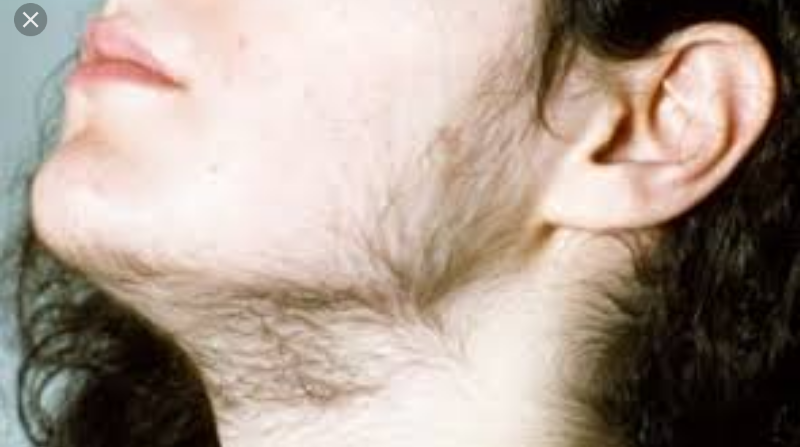Hirsutism
Hirsutism (HUR-soot-iz-um) is a condition of unwanted, male-pattern hair growth in women. Hirsutism results in excessive amounts of dark, course hair on body areas where men typically grow hair — face, chest and back.
The amount of body hair you have is largely determined by your genetic makeup. There's a wide range of normal hair distribution, thickness and color due to differences in heredity. However, hirsutism is a medical condition that can arise from excess male hormones called androgens, primarily testosterone. It can also be due to a family trait.
Symptoms
Hirsutism is stiff and dark body hair, appearing on the body where women don't commonly have hair — primarily the face, chest and back. What's considered excessive can vary depending on ethnicity and culture.
When excessively high androgen levels cause hirsutism, other signs might develop over time, a process called virilization. Signs of virilization might include:
- Deepening voice
- Balding
- Acne
- Decreased breast size
- Increased muscle mass
- Enlargement of the clitoris
Causes
At puberty, a girl's ovaries begin to produce a mix of female and male sex hormones, causing hair to grow in the armpits and pubic area. Hirsutism can occur if the mix becomes unbalanced with too high a proportion of male sex hormones (androgens).
Hirsutism can be caused by:
- Polycystic ovary syndrome. This most common cause of hirsutism is caused by an imbalance of sex hormones that can result in irregular periods, obesity, infertility and sometimes multiple cysts on your ovaries.
- Cushing's syndrome. This occurs when your body is exposed to high levels of the hormone cortisol. It can develop from your adrenal glands making too much cortisol or from taking medications such as prednisone over a long period.
- Congenital adrenal hyperplasia. This inherited condition is characterized by abnormal production of steroid hormones, including cortisol and androgen, by your adrenal glands.
- Tumors. Rarely, an androgen-secreting tumor in the ovaries or adrenal glands can cause hirsutism.
- Medications. Some medications can cause hirsutism. These include danazol, which is used to treat women with endometriosis; systemic corticosteroids and fluoxetine (Prozac) for depression.
Sometimes, hirsutism can occur with no identifiable cause. This happens more frequently in certain populations, such as in women of Mediterranean, Middle Eastern and South Asian ancestry.
Risk factors
Several factors can influence your likelihood of developing hirsutism, including:
- Family history. Several conditions that cause hirsutism, including congenital adrenal hyperplasia and polycystic ovary syndrome, run in families.
- Ancestry. Women of Mediterranean, Middle Eastern and South Asian ancestry are more likely to develop hirsutism with no identifiable cause than are other women.
- Obesity. Being obese causes increased androgen production, which can worsen hirsutism.
Complications
Hirsutism can be emotionally distressing. Some women feel self-conscious about having unwanted body hair. Some develop depression. Also, although hirsutism doesn't cause physical complications, the underlying cause of a hormonal imbalance can.
If you have hirsutism and irregular periods, you might have polycystic ovary syndrome, which can inhibit fertility. Women who take certain medications to treat hirsutism should avoid pregnancy because of the risk of birth defects.





Comments